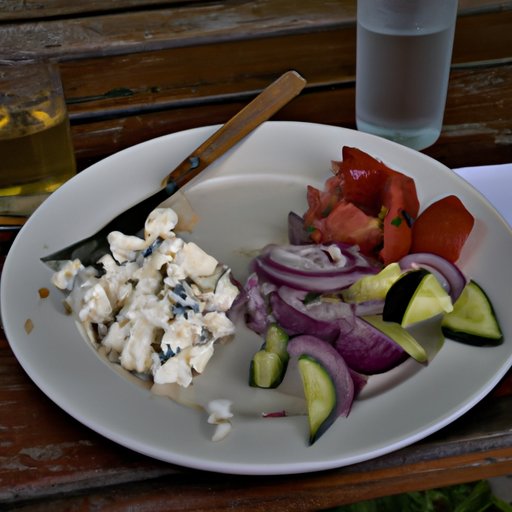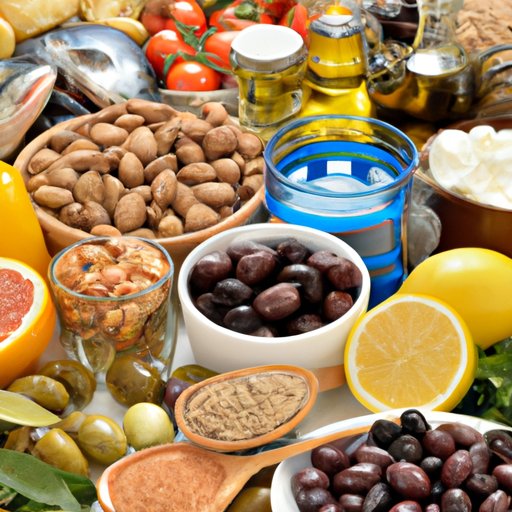Introduction
Greek cuisine is known for its unique flavors and ingredients, with recipes passed down through generations. It is a healthy, balanced diet that has been enjoyed by Greeks for centuries. But what makes Greek food so healthy? In this article, we will explore the nutritional benefits of traditional Greek dishes, as well as the health benefits of following a Mediterranean diet.
A Nutritional Analysis of Greek Cuisine
Greek cuisine is composed of a variety of different macronutrients, including carbohydrates, proteins, and fats. The majority of meals include some form of carbohydrate, such as bread, rice, or pasta, as well as lean proteins like chicken, fish, and legumes. Fats are also an important part of the Greek diet, with olive oil being the primary source of fat in many dishes.
In terms of micronutrients, Greek cuisine is rich in vitamins and minerals. Traditional dishes often include a variety of vegetables, fruits, legumes, and whole grains, all of which provide essential nutrients. Herbs and spices are also commonly used in Greek cooking, adding flavor and additional health benefits.
Overall, Greek cuisine offers a range of health benefits. Studies have shown that following a Mediterranean-style diet can reduce the risk of heart disease, stroke, type 2 diabetes, and certain types of cancer.

Exploring the Health Benefits of Traditional Greek Dishes
There are several traditional Greek dishes that offer a range of health benefits. Here are just a few:
Olive Oil
Olive oil is a staple in Greek cuisine and is considered one of the healthiest fats available. It is high in monounsaturated fatty acids, which can help reduce levels of bad cholesterol. Studies have also shown that olive oil can help protect against heart disease and certain types of cancer.
Fish
Fish is an important part of the Greek diet, with dishes like grilled fish, baked cod, and calamari being popular choices. Fish is rich in omega-3 fatty acids, which can help reduce inflammation and lower the risk of heart disease. It is also a great source of protein and low in calories.
Vegetables
Vegetables are an essential part of the Greek diet, with dishes like spanakopita (spinach pie) and dolmades (stuffed vine leaves) being popular choices. Vegetables are packed with vitamins, minerals, and fiber, and can help reduce the risk of chronic diseases. They are also low in calories and can help you feel fuller for longer.
Legumes
Legumes, such as beans, chickpeas, and lentils, are widely used in Greek cuisine. They are rich in protein and fiber, and can help reduce cholesterol levels. Legumes are also a great source of iron, potassium, and magnesium, and can help keep you feeling full longer.
Fruits
Fruits are an important part of the Greek diet, with dishes like baklava and galaktoboureko (custard-filled pastry) being popular choices. Fruits are packed with vitamins, minerals, and antioxidants, and can help reduce the risk of chronic diseases. They are also low in calories and can help you feel fuller for longer.
How to Eat Healthy While Enjoying Greek Food
Eating healthy doesn’t mean you have to give up your favorite Greek dishes. Here are some tips on how to make healthy choices while still enjoying Greek food:
Balance Your Diet
It’s important to have a balanced diet that includes a variety of foods from all the major food groups. Aim for meals that include at least one serving of vegetables, a small portion of lean protein, and a source of healthy fats, such as olive oil.
Cook with Healthy Ingredients
When cooking Greek dishes, opt for healthy ingredients such as fresh vegetables, lean meats, and olive oil. Avoid processed foods and choose whole grains instead of refined carbs.
Choose Low-Fat Dairy Products
Greek cuisine often includes dairy products, such as yogurt and feta cheese. Opt for low-fat varieties to reduce your intake of saturated fats.
Opt for Lean Protein Sources
Protein is an important part of any balanced diet. Choose lean sources of protein, such as chicken, fish, and legumes, to reduce your intake of saturated fats.

The Healthiest Ingredients in Greek Cooking
Greek cooking uses a variety of healthy ingredients that can help you meet your nutritional needs. Here are some of the healthiest ingredients in Greek cooking:
Olives
Olives are a staple in Greek cuisine and are packed with healthy fats, vitamins, and minerals. They are also a good source of fiber and can help reduce cholesterol levels.
Herbs and Spices
Herbs and spices are commonly used in Greek cooking, adding flavor and additional health benefits. Oregano, thyme, and bay leaves are all popular choices, and can help reduce inflammation and boost immunity.
Whole Grains
Whole grains are an important part of the Greek diet, with dishes like moussaka (eggplant casserole) and pilaf (rice dish) being popular choices. Whole grains are packed with vitamins, minerals, and fiber, and can help reduce the risk of chronic diseases.
Nuts and Seeds
Nuts and seeds are often used in Greek cuisine, adding texture and flavor to dishes. They are a great source of healthy fats, protein, and fiber, and can help reduce cholesterol levels.
Is Mediterranean Diet the Key to a Healthy Lifestyle?
The Mediterranean diet is based on the traditional diets of countries bordering the Mediterranean Sea. It emphasizes the consumption of fruits, vegetables, whole grains, legumes, and healthy fats, such as olive oil. Studies have shown that following a Mediterranean-style diet can reduce the risk of heart disease, stroke, type 2 diabetes, and certain types of cancer.
However, there are some limitations to the Mediterranean diet. For example, it does not include any specific guidelines for portion sizes or calorie counting, and it does not always emphasize the importance of limiting processed foods. Additionally, some studies have found that the Mediterranean diet may not be as beneficial for people living in countries outside the Mediterranean region.

Reasons to Choose Greek Food for a Balanced Diet
Greek cuisine is a healthy, balanced diet that has been enjoyed by Greeks for centuries. Here are some reasons to choose Greek food for a balanced diet:
Variety of Foods
Greek cuisine offers a variety of foods from all the major food groups. This allows you to enjoy a wide range of flavors and textures, while still getting all the essential nutrients your body needs.
Low in Saturated Fats
Greek cuisine is low in saturated fats, with olive oil being the primary source of fat in many dishes. This can help reduce cholesterol levels and reduce the risk of heart disease.
High in Fiber
Greek cuisine is high in fiber, with dishes like moussaka (eggplant casserole) and pilaf (rice dish) being popular choices. Fiber can help reduce cholesterol levels, regulate blood sugar levels, and keep you feeling fuller for longer.
Rich in Antioxidants
Greek cuisine is rich in antioxidants, with dishes like baklava and galaktoboureko (custard-filled pastry) being popular choices. Antioxidants can help reduce inflammation and protect against certain types of cancer.
Conclusion
Greek cuisine is a healthy, balanced diet that has been enjoyed by Greeks for centuries. It is composed of a variety of different macronutrients and micronutrients, offering a range of health benefits. Traditional dishes often include a variety of vegetables, fruits, legumes, and whole grains, all of which provide essential nutrients. Additionally, following a Mediterranean-style diet can reduce the risk of heart disease, stroke, type 2 diabetes, and certain types of cancer. With these tips, you can enjoy the flavors and health benefits of Greek food while still making healthy choices.
(Note: Is this article not meeting your expectations? Do you have knowledge or insights to share? Unlock new opportunities and expand your reach by joining our authors team. Click Registration to join us and share your expertise with our readers.)
